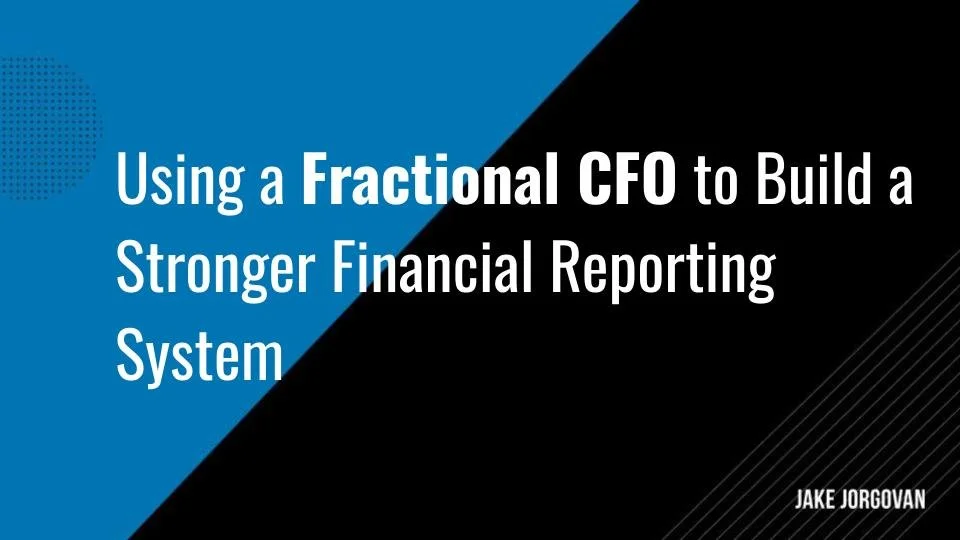Using a Fractional CFO to Strengthen Your Financial Reporting System
A strong financial reporting system is crucial for business growth and decision-making.
However, many companies lack the expertise to build one in-house.
This is where a fractional CFO can make a significant impact.
A fractional CFO helps businesses implement robust reporting systems without the cost of a full-time executive.
This approach ensures accuracy, compliance, and insightful financial data.
This article explores how using a fractional CFO can transform your financial reporting system and set your business up for long-term success.
5 Ways to Leverage a Fractional CFO for Stronger Financial Reporting
1) Implement Scalable Financial Processes And Controls
Building scalable financial processes with a fractional CFO allows you to grow without the burden of full-time hiring costs. A fractional CFO integrates seamlessly with your current team and elevates processes without disrupting workflows. This creates a stronger foundation for both present and future financial reporting needs. Here’s how to use a fractional CFO to implement scalable solutions:
Assess Current Financial Processes: Start by identifying inefficiencies in your financial workflows. The fractional CFO evaluates your existing systems, pinpointing areas that need immediate improvement.
Establish Consistent Reporting Standards: Implement clear guidelines for all financial reporting. This ensures consistency across departments and provides uniformity in data collection and analysis.
Automate Where Necessary: Utilize technology to streamline repetitive financial tasks. The CFO identifies appropriate tools that fit your company’s needs, reduce manual errors, and improve efficiency.
Create Scalable Controls: Set up control mechanisms that grow with your business. A fractional CFO ensures that these controls remain effective as your organization expands, helping maintain accountability and accuracy in financial data.
Train Key Team Members: Equip your internal team with the skills needed to manage these enhanced processes. Regular training ensures your staff can handle the new systems without external dependency.
Insider Tip:
We suggest collaborating with your fractional CFO to create a “future-proof” financial blueprint. This should include potential expansion scenarios to ensure that even with growth, your systems remain scalable, avoiding future bottlenecks.
2) Enhance Accuracy In Financial Forecasting And Budgeting
Predictable financial forecasting is critical for making informed decisions. Using a fractional CFO allows you to build a reliable, data-driven framework that will support strategic planning while eliminating unnecessary risk. This approach equips you with forecasts that reflect real-time data and long-term objectives. Here’s how to use this approach:
Analyze Historical Data: A fractional CFO examines your company’s financial history. This provides a foundation for creating realistic forecasts, based on actual performance rather than assumptions.
Develop Custom Financial Models: Tailor models that fit your business’s unique needs. The CFO creates flexible templates that adapt to different scenarios and helps you make informed decisions across various market conditions.
Refine Budgeting Processes: A fractional CFO works with your team to create accurate budgets. This improves your ability to allocate resources strategically and align budgeting with your overall business goals.
Introduce Real-Time Tracking Tools: Implement technology to track your actual performance against forecasts. The CFO ensures you can measure key metrics continuously, making it easier to adjust as new information becomes available.
Run Scenario-Based Simulations: Simulate different financial outcomes to stress-test your forecasts. This helps you prepare for uncertainties and adjust your strategy accordingly, which reduces exposure to unexpected risks.
Insider Tip:
We always recommend developing a rolling forecast strategy with your fractional CFO. This lets you update your financial outlook regularly and integrate real-time insights without waiting for the year-end review. It strengthens your ability to pivot and adjust to both growth opportunities and market disruptions.
3) Streamline Financial Data Collection And Analysis
A fractional CFO can quickly improve how you gather and analyze financial data. This makes your systems more efficient without adding permanent overhead. Data collection might seem routine, but inconsistencies slow your decision-making and reduce accuracy. To scale effectively, you need a streamlined process that delivers actionable insights with precision. Follow these steps:
Audit Your Current Data Sources: A fractional CFO will review where your data comes from and assess its reliability. This step is crucial in eliminating data redundancies and identifying gaps.
Integrate Data Collection Tools: The CFO selects software that best fits your business. This helps automate financial data gathering, cutting manual work and reducing errors that can cost you in the long run.
Set Clear Data Management Protocols: Establish standards for how data should be recorded and maintained. Consistency in these protocols ensures accurate, comparable data across departments and systems.
Implement Regular Data Reviews: Schedule ongoing reviews to catch discrepancies early. The CFO sets up a process for monthly or quarterly checks, ensuring your data reflects real-time financial realities.
Centralize Financial Data Access: Create a unified platform where all key stakeholders can access the same data. This makes reporting more efficient, while improving cross-departmental collaboration and accountability.
Insider Tip:
We advise asking your fractional CFO to build custom dashboards that provide real-time financial snapshots. This gives you immediate visibility into key metrics and streamlines decision-making without waiting for full reports. It’s a small investment that pays off in speed and clarity.
4) Improve Regulatory Compliance And Reporting Standards
Maintaining compliance while managing financial reporting can be complex, especially as regulations shift. A fractional CFO specializes in aligning your financial systems with regulatory standards without overwhelming your existing team. Their expertise helps mitigate risks and avoid costly errors that can lead to penalties or audits. Here’s how they do it:
Identify Relevant Compliance Requirements: A fractional CFO will assess your industry’s specific regulatory needs. This includes understanding tax obligations, financial reporting requirements, and any legal standards tied to your operations.
Standardize Reporting Procedures: Set clear guidelines for your financial reports. The CFO creates a template that adheres to compliance requirements, ensuring accuracy and minimizing potential discrepancies.
Establish Regular Audit Processes: Build a routine audit schedule to catch issues before they escalate. The CFO works with your team to set up internal audits or prepare for external ones, maintaining compliance and reducing risk.
Implement Compliance-Focused Software: Use technology that automatically integrates compliance checks. The CFO selects software that flags discrepancies, ensuring your financial data always meets regulatory standards.
Train Your Team on Regulatory Updates: Keep your staff up to date on changing regulations. The CFO provides training sessions to ensure everyone understands new compliance standards and integrates them into daily operations.
Insider Tip:
We suggest having your fractional CFO develop a compliance calendar that tracks filing deadlines and audit schedules. This helps you avoid last-minute scrambles and keeps your reporting consistent and error-free throughout the year. By planning in advance, you’ll save time and reduce stress.
5) Optimize Financial Software And Technology Integration
A fractional CFO is crucial in aligning your financial systems with the right technology and ensures efficient reporting and data management. Financial software integration can be challenging, especially when your current systems are outdated or fragmented. With a fractional CFO, you get the guidance needed to implement tools that improve accuracy, streamline workflows, and support future growth. Here’s how:
Assess Your Current Technology Stack: A fractional CFO reviews the software and tools you already use. This step identifies inefficiencies, gaps in functionality, and areas that need upgrades or replacements.
Select Financial Software That Fits: Choose technology based on your business’s unique needs. The CFO evaluates different platforms and selects solutions that handle your financial complexity while offering scalability for future growth.
Integrate Systems for Cross-Functionality: Connect your financial software with other business systems like CRM or ERP tools. This integration ensures seamless data flow across departments, eliminating silos and improving overall decision-making.
Customize Reporting Features: Adjust the software’s reporting capabilities to suit your business. The CFO sets up tailored dashboards and reporting formats that provide real-time insights and improve transparency across the organization.
Train Your Team on New Tools: Make sure your team is fully capable of using the software. The CFO conducts training sessions to bring everyone up to speed, ensuring your staff can maximize the technology’s potential.
Insider Tip:
We recommend asking your fractional CFO to create a long-term technology roadmap that aligns with your business strategy. This will help you stay ahead of potential tech shifts, ensuring your financial systems evolve with your growing needs rather than lag behind. A proactive approach will avoid costly overhauls down the road.
Build a Stronger Financial Reporting System with Confidence
A strong financial reporting system is the foundation of sound business decisions.
A fractional CFO offers the expertise needed to strengthen this system without the cost of a full-time hire.
This approach ensures your financial data is accurate, timely, and actionable.
Integrating a fractional CFO allows you to achieve the clarity and precision required to navigate complex financial landscapes.
As companies face increasing financial demands, the value of having expert leadership—on your terms—becomes undeniable.
The opportunity to elevate your financial reporting system has never been more accessible.














